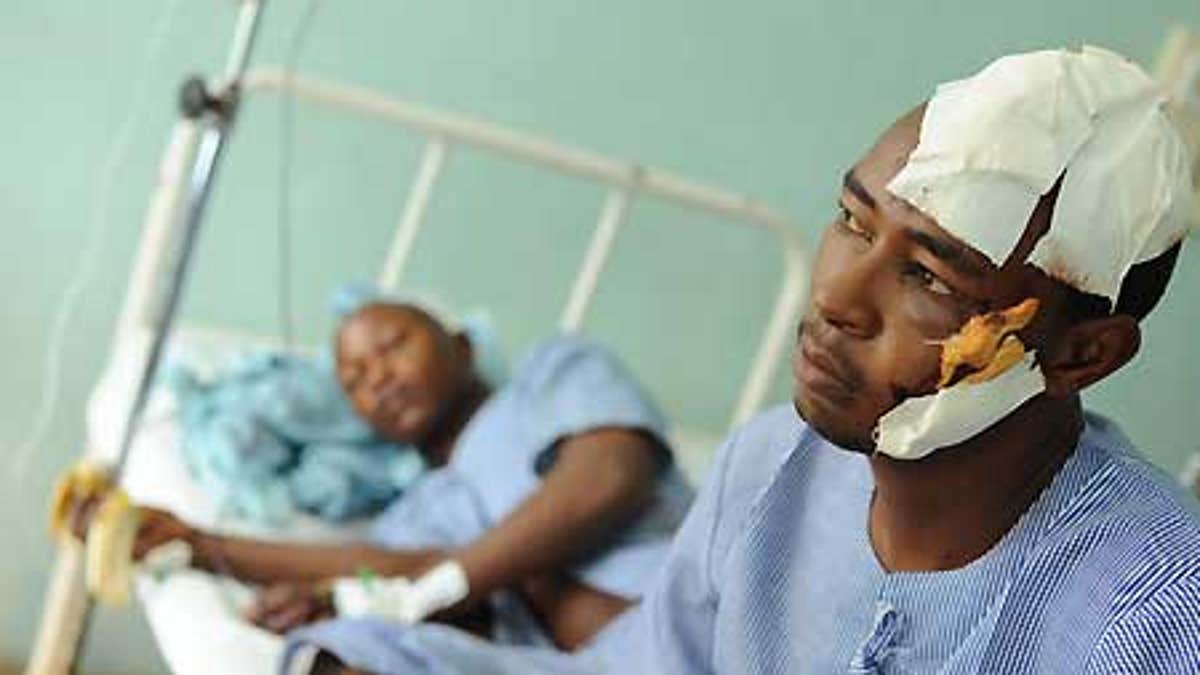
April 21: Zacariah Ndegu, left, and Joseph Moridu, were both injured in fighting between residents of Gathaithi, Kenya, and the Mungiki gang. (AP)
GATHAITHI, Kenya – Villagers in central Kenya clashed with an outlawed criminal gang using machetes, axes and clubs, killing at least 28 people and leaving streets stained with blood, police said Tuesday.
Residents near the town of Karatina fought Mungiki members overnight because the gang had been extorting money from them, deputy police spokesman Charles Owino said.
"The majority of the dead are Mungiki members," Owino told The Associated Press.
The Mungiki emerged in the 1990s, inspired by the 1950s Mau Mau rebellion against British colonial rule, and the gang has been linked to extortion, murder and political violence. The group is believed to have thousands of followers, drawn from the Kikuyu, Kenya's largest tribe and the dominant force in the country's politics and business.
Kenya is riven by ethnic loyalties and the country's dozens of other tribes have long resented the dominance of the Kikuyu. Tribal-based election riots that erupted early in 2008 killed more than 1,000 people dead and forced tens of thousands from their homes.
In the village of Gathaithi, where the attacks took place overnight, the scene was eerily quiet Tuesday morning. Shops were shuttered and women milled around under the midday sun.
Mary Maina, 45, a mother of four, said a mob came for her husband, Stephen Waweru, just after midnight. She insisted he was a stonemason and not a Mungiki member.
"About 300 people came and started banging the door and demanded that my husband come out," she said. "They almost broke down the door and he was forced to come out dressed in only a long jacket and underwear. He did not come back after that. I found his body on the road."
One member of the Mungiki, Ephantus Mwangi, crouched in the bushes near a police roadblock about 18 miles from Gathaithi, watching the road anxiously.
He said hundreds of young men and policemen had come into Gathaithi on Monday night looking for Mungiki members, and he expected a second wave of attacks. Two of his colleagues had been shot and were hiding elsewhere in the bushes trying to recover, he said.
A mob of villagers, he said, had killed 13 of his fellow gang members in the last three weeks.
Besides the dead, three people were seriously injured in the violence and police arrested 37 people, police spokesman Eric Kiraithe said. Police also seized machetes, axes and clubs from the suspects.
Kiraithe urged members of the public to stop "using criminal violence to resist crime."
But one Mungiki member said police were part of the problem.
She told the AP that the Mungiki had been extorting money from businesses in the area with the full knowledge of the police until last week, when police switched sides and backed residents who then lynched gang members. She spoke on condition of anonymity for fear of reprisals.
Kiraithe, the police spokesman, said Mungiki members were "trying to justify crime by mudslinging."
